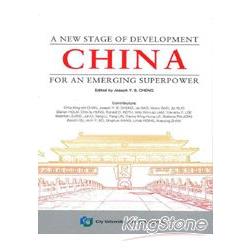【電子書】China:A New Stage of Development for an Emerging Superpower
活動訊息
用閱讀開啟視野,讓書成為照亮你人生的光
【金石堂選書】本月推薦您這些好書👉 快來看看
內容簡介
This volume presents a timely assessment of the Hu–Wen Administration at the juncture of preparing a change of China’s leadership in 2012–13. The assessment is important because the administration’s apparent success tends to create a path-dependent orientation on the part of its successor.
Bringing together a collection of nineteen major essays, this book offers a fresh perspective of evaluating the performance and achievements of China in the Hu–Wen era in terms of economic development, the establishment of a rudimentary social security system and her rising international status. The new opportunities and challenges facing China, and how will the likely successors Xi Jinping and Li Keqiang handle those opportunities and challenges, as well as new policy programmes will also be discussed in greater detail. Each essay is written by experts and scholars from different academic disciplines and backgrounds to provide readers with a unique overview of their respective areas of expertise.
This book will provide a platform for further informed deliberations among academics, students, corporate executives and professionals who are interested in China’s development.
Bringing together a collection of nineteen major essays, this book offers a fresh perspective of evaluating the performance and achievements of China in the Hu–Wen era in terms of economic development, the establishment of a rudimentary social security system and her rising international status. The new opportunities and challenges facing China, and how will the likely successors Xi Jinping and Li Keqiang handle those opportunities and challenges, as well as new policy programmes will also be discussed in greater detail. Each essay is written by experts and scholars from different academic disciplines and backgrounds to provide readers with a unique overview of their respective areas of expertise.
This book will provide a platform for further informed deliberations among academics, students, corporate executives and professionals who are interested in China’s development.
目錄
1.Challenges for Hu-Wen and Their Successors: Consolidating the ”Beijing Consensus” Model
—Joseph Y. S. CHENG
2.Democratization within the CPC and the Future of Democracy in China
—Feng LIN
3.Purchase of Office in China: A Shortcut for Career Advancement?
—Jun LI and Joseph Y. S. CHENG
4.Cadre Performance Appraisal and Fabrication of Economic Achievement in Chinese Officialdom
—Jun LI and Joseph Y. S. CHENG
5.The Internet and Political Marketing in Globalizing China
—Chin-fu HUNG
6.The Transitional Role of the Hu-Wen Leadership in China: A Case Study of Liu Xiaobo
—Mobo GAO
7.China Wages Quasi-Superpower Diplomacy
—Willy Wo-Lap LAM
8.New History Inside Hu Jintao’s Foreign Policy: ”Harmony” versus ”Hegemony”
—Ronald C. KEITH
9.Battle Ready? Developing a Blue-water Navy. China’s Strategic Dilemma
—Joseph Y. S. CHENG and Stefania PALADINI
10.The Twelfth Five-Year Plan: Strategic Adjustments, the Impact of the Global Financial Tsunami, and the Socio-Political Challenges
—Joseph Y. S. CHENG
11.China’s Financial Development under Hu-Wen’s Leadership: The Unfinished Revolution
—Baozhi QU and Yang LI
12.Labour Policies under Hu-Wen’s Regime: Transformation and Challenges
—Chris King-chi CHAN
13.New Labour Law and Its Implication for the Human Rights Regime in China
—Alvin Y. SO
14.China’s Green Challenges in the Rise to Global Power under the Leadership of Hu Jintao
—Carlos Wing-Hung LO, Yok-shiu F. LEE and Xueyong ZHAN
15.Challenges and Prospects of Reforestation in Contemporary China: The Case of the Grain for Green Project
—Jie GAO and Jia GUO
16.Observations on Education Policy under Hu’s Leadership and Wen’s Administration: The Past and the Next Decade
—Steven HOLM
17.Strengthening Political Education in Chinese Universities in the Hu Jintao Era: A Critical Reading of the CPC’s No. 16 Document (2004)
—Qinghua WANG
18.Mending the Chinese Welfare Net: Tool for Social Harmony or Regime Stability?
—Linda WONG
19.Sino-Vatican Relations in China’s Rise: From Clash of Authority to Accommodation
—Beatrice LEUNG
20. Epilogue
—Joseph Y. S. CHENG
—Joseph Y. S. CHENG
2.Democratization within the CPC and the Future of Democracy in China
—Feng LIN
3.Purchase of Office in China: A Shortcut for Career Advancement?
—Jun LI and Joseph Y. S. CHENG
4.Cadre Performance Appraisal and Fabrication of Economic Achievement in Chinese Officialdom
—Jun LI and Joseph Y. S. CHENG
5.The Internet and Political Marketing in Globalizing China
—Chin-fu HUNG
6.The Transitional Role of the Hu-Wen Leadership in China: A Case Study of Liu Xiaobo
—Mobo GAO
7.China Wages Quasi-Superpower Diplomacy
—Willy Wo-Lap LAM
8.New History Inside Hu Jintao’s Foreign Policy: ”Harmony” versus ”Hegemony”
—Ronald C. KEITH
9.Battle Ready? Developing a Blue-water Navy. China’s Strategic Dilemma
—Joseph Y. S. CHENG and Stefania PALADINI
10.The Twelfth Five-Year Plan: Strategic Adjustments, the Impact of the Global Financial Tsunami, and the Socio-Political Challenges
—Joseph Y. S. CHENG
11.China’s Financial Development under Hu-Wen’s Leadership: The Unfinished Revolution
—Baozhi QU and Yang LI
12.Labour Policies under Hu-Wen’s Regime: Transformation and Challenges
—Chris King-chi CHAN
13.New Labour Law and Its Implication for the Human Rights Regime in China
—Alvin Y. SO
14.China’s Green Challenges in the Rise to Global Power under the Leadership of Hu Jintao
—Carlos Wing-Hung LO, Yok-shiu F. LEE and Xueyong ZHAN
15.Challenges and Prospects of Reforestation in Contemporary China: The Case of the Grain for Green Project
—Jie GAO and Jia GUO
16.Observations on Education Policy under Hu’s Leadership and Wen’s Administration: The Past and the Next Decade
—Steven HOLM
17.Strengthening Political Education in Chinese Universities in the Hu Jintao Era: A Critical Reading of the CPC’s No. 16 Document (2004)
—Qinghua WANG
18.Mending the Chinese Welfare Net: Tool for Social Harmony or Regime Stability?
—Linda WONG
19.Sino-Vatican Relations in China’s Rise: From Clash of Authority to Accommodation
—Beatrice LEUNG
20. Epilogue
—Joseph Y. S. CHENG
序/導讀
Prefce
China’s achievements in economic development and improvement in international status have been impressive in the past decade. The adjustments in economic development strategy took place before the international financial tsunami in 2008–9, and the response to the crisis was decisive. The building of a social security net covering the entire population has been benefitting hundreds of millions people. Much credit goes to the Hu Jintao–Wen Jiabao administration in 2002–2012.
At the same time, there has been no significant political reforms in the past decade and more. Corruption has become more rampant; various vested interests have been more entrenched. Even official think-tank researchers admit that policy implementation often encounters strong resistance at the local level. Despite the raising of living standards, dissatisfaction and grievances continue to accumulate as reflected by the increases in frequency and scale of mass incidents. Unrest and riots in ethnic minority areas pose an obvious challenge.
The Chinese economy promptly recovered from the recent international financial crisis, but the economic downturn in the United States and Europe is expected to dampen China’s exports. The external economic environment is less likely to offer strong support for sustainable high growth rates. Meanwhile, economic difficulties in the developed countries generate more pressure on China to adjust its high dependence on trade and assume greater responsibility for the reform of the international financial structure.
The high-profile “return to Asia” strategy of the Obama administration fully exploits the uneasiness of China’s neighbours which have been concerned with the Chinese leadership’s assertiveness in territorial disputes and its military modernization programme. Their hedging strategies in turn facilitate the United States’ attempts to contain China’s influence and secure a guiding role in the regional economic integration process. Beijing now experiences diplomatic setbacks and is aware that greater efforts are required to re-assure the countries in the Asia-Pacific region.
Assessment of the Hu-Wen administration’s performance is a complicated task; it is important because the administration’s apparent success tends to create a path-dependence orientation on the part of its successor. A team of experts has been recruited to offer a volume to evaluate the administration’s achievements and difficulties in various policy areas, as well as the likely challenges and policy changes in the years ahead. Each author has been invited to focus on one important issue and offer his/her analysis, so that this book will provide a platform for further informed deliberations among academics, students, corporate executives and professionals who are interested in China’s development.
I would like to take this opportunity to thank all the authors for their support and co-operation. Thanks are also due to the staff of the City University of Hong Kong Press for their professionalism and dedication throughout the publication process.
Joseph Y. S. Cheng
January 2012
China’s achievements in economic development and improvement in international status have been impressive in the past decade. The adjustments in economic development strategy took place before the international financial tsunami in 2008–9, and the response to the crisis was decisive. The building of a social security net covering the entire population has been benefitting hundreds of millions people. Much credit goes to the Hu Jintao–Wen Jiabao administration in 2002–2012.
At the same time, there has been no significant political reforms in the past decade and more. Corruption has become more rampant; various vested interests have been more entrenched. Even official think-tank researchers admit that policy implementation often encounters strong resistance at the local level. Despite the raising of living standards, dissatisfaction and grievances continue to accumulate as reflected by the increases in frequency and scale of mass incidents. Unrest and riots in ethnic minority areas pose an obvious challenge.
The Chinese economy promptly recovered from the recent international financial crisis, but the economic downturn in the United States and Europe is expected to dampen China’s exports. The external economic environment is less likely to offer strong support for sustainable high growth rates. Meanwhile, economic difficulties in the developed countries generate more pressure on China to adjust its high dependence on trade and assume greater responsibility for the reform of the international financial structure.
The high-profile “return to Asia” strategy of the Obama administration fully exploits the uneasiness of China’s neighbours which have been concerned with the Chinese leadership’s assertiveness in territorial disputes and its military modernization programme. Their hedging strategies in turn facilitate the United States’ attempts to contain China’s influence and secure a guiding role in the regional economic integration process. Beijing now experiences diplomatic setbacks and is aware that greater efforts are required to re-assure the countries in the Asia-Pacific region.
Assessment of the Hu-Wen administration’s performance is a complicated task; it is important because the administration’s apparent success tends to create a path-dependence orientation on the part of its successor. A team of experts has been recruited to offer a volume to evaluate the administration’s achievements and difficulties in various policy areas, as well as the likely challenges and policy changes in the years ahead. Each author has been invited to focus on one important issue and offer his/her analysis, so that this book will provide a platform for further informed deliberations among academics, students, corporate executives and professionals who are interested in China’s development.
I would like to take this opportunity to thank all the authors for their support and co-operation. Thanks are also due to the staff of the City University of Hong Kong Press for their professionalism and dedication throughout the publication process.
Joseph Y. S. Cheng
January 2012
試閱
【Prefce】
China’s achievements in economic development and improvement in international status have been impressive in the past decade. The adjustments in economic development strategy took place before the international financial tsunami in 2008–9, and the response to the crisis was decisive. The building of a social security net covering the entire population has been benefitting hundreds of millions people. Much credit goes to the Hu Jintao–Wen Jiabao administration in 2002–2012.
At the same time, there has been no significant political reforms in the past decade and more. Corruption has become more rampant; various vested interests have been more entrenched. Even official think-tank researchers admit that policy implementation often encounters strong resistance at the local level. Despite the raising of living standards, dissatisfaction and grievances continue to accumulate as reflected by the increases in frequency and scale of mass incidents. Unrest and riots in ethnic minority areas pose an obvious challenge.
The Chinese economy promptly recovered from the recent international financial crisis, but the economic downturn in the United States and Europe is expected to dampen China’s exports. The external economic environment is less likely to offer strong support for sustainable high growth rates. Meanwhile, economic difficulties in the developed countries generate more pressure on China to adjust its high dependence on trade and assume greater responsibility for the reform of the international financial structure.
The high-profile “return to Asia” strategy of the Obama administration fully exploits the uneasiness of China’s neighbours which have been concerned with the Chinese leadership’s assertiveness in territorial disputes and its military modernization programme. Their hedging strategies in turn facilitate the United States’ attempts to contain China’s influence and secure a guiding role in the regional economic integration process. Beijing now experiences diplomatic setbacks and is aware that greater efforts are required to re-assure the countries in the Asia-Pacific region.
Assessment of the Hu-Wen administration’s performance is a complicated task; it is important because the administration’s apparent success tends to create a path-dependence orientation on the part of its successor. A team of experts has been recruited to offer a volume to evaluate the administration’s achievements and difficulties in various policy areas, as well as the likely challenges and policy changes in the years ahead. Each author has been invited to focus on one important issue and offer his/her analysis, so that this book will provide a platform for further informed deliberations among academics, students, corporate executives and professionals who are interested in China’s development.
I would like to take this opportunity to thank all the authors for their support and co-operation. Thanks are also due to the staff of the City University of Hong Kong Press for their professionalism and dedication throughout the publication process.
Joseph Y. S. Cheng
January 2012
China’s achievements in economic development and improvement in international status have been impressive in the past decade. The adjustments in economic development strategy took place before the international financial tsunami in 2008–9, and the response to the crisis was decisive. The building of a social security net covering the entire population has been benefitting hundreds of millions people. Much credit goes to the Hu Jintao–Wen Jiabao administration in 2002–2012.
At the same time, there has been no significant political reforms in the past decade and more. Corruption has become more rampant; various vested interests have been more entrenched. Even official think-tank researchers admit that policy implementation often encounters strong resistance at the local level. Despite the raising of living standards, dissatisfaction and grievances continue to accumulate as reflected by the increases in frequency and scale of mass incidents. Unrest and riots in ethnic minority areas pose an obvious challenge.
The Chinese economy promptly recovered from the recent international financial crisis, but the economic downturn in the United States and Europe is expected to dampen China’s exports. The external economic environment is less likely to offer strong support for sustainable high growth rates. Meanwhile, economic difficulties in the developed countries generate more pressure on China to adjust its high dependence on trade and assume greater responsibility for the reform of the international financial structure.
The high-profile “return to Asia” strategy of the Obama administration fully exploits the uneasiness of China’s neighbours which have been concerned with the Chinese leadership’s assertiveness in territorial disputes and its military modernization programme. Their hedging strategies in turn facilitate the United States’ attempts to contain China’s influence and secure a guiding role in the regional economic integration process. Beijing now experiences diplomatic setbacks and is aware that greater efforts are required to re-assure the countries in the Asia-Pacific region.
Assessment of the Hu-Wen administration’s performance is a complicated task; it is important because the administration’s apparent success tends to create a path-dependence orientation on the part of its successor. A team of experts has been recruited to offer a volume to evaluate the administration’s achievements and difficulties in various policy areas, as well as the likely challenges and policy changes in the years ahead. Each author has been invited to focus on one important issue and offer his/her analysis, so that this book will provide a platform for further informed deliberations among academics, students, corporate executives and professionals who are interested in China’s development.
I would like to take this opportunity to thank all the authors for their support and co-operation. Thanks are also due to the staff of the City University of Hong Kong Press for their professionalism and dedication throughout the publication process.
Joseph Y. S. Cheng
January 2012
訂購/退換貨須知
購買須知:
使用金石堂電子書服務即為同意金石堂電子書服務條款。
電子書分為「金石堂(線上閱讀+APP)」及「Readmoo(兌換碼)」兩種:
- 請至會員中心→電子書服務「我的e書櫃」領取複製『兌換碼』至電子書服務商Readmoo進行兌換。
退換貨須知:
- 因版權保護,您在金石堂所購買的電子書僅能以金石堂專屬的閱讀軟體開啟閱讀,無法以其他閱讀器或直接下載檔案。
- 依據「消費者保護法」第19條及行政院消費者保護處公告之「通訊交易解除權合理例外情事適用準則」,非以有形媒介提供之數位內容或一經提供即為完成之線上服務,經消費者事先同意始提供。(如:電子書、電子雜誌、下載版軟體、虛擬商品…等),不受「網購服務需提供七日鑑賞期」的限制。為維護您的權益,建議您先使用「試閱」功能後再付款購買。










商品評價